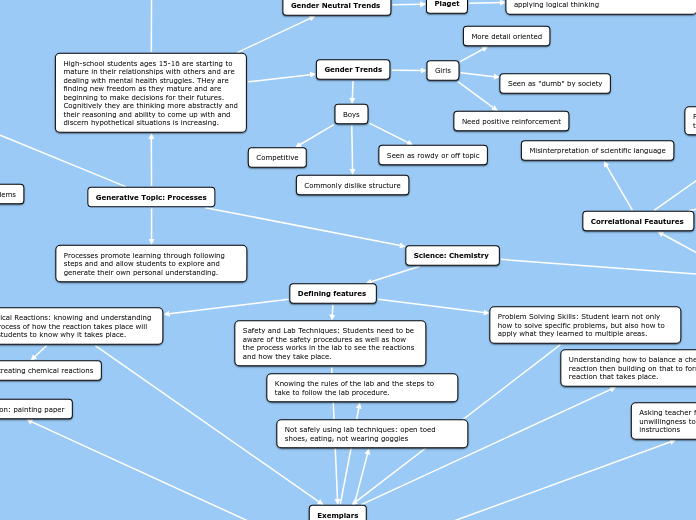Generative Topic: Processes
Processes promote learning through following steps and and allow students to explore and generate their own personal understanding.
High-school students ages 15-16 are starting to mature in their relationships with others and are dealing with mental health struggles. THey are finding new freedom as they mature and are beginning to make decisions for their futures. Cognitively they are thinking more abstractly and their reasoning and ability to come up with and discern hypothetical situations is increasing.
Attention Span
Roughly 30 min without breaks or opportunity to complete a different task
Gender Neutral Trends
Vygotsky
Using group work with pre teaching and formative assessments frequently
Piaget
Using abstract and hypothetical thought and applying logical thinking
Gender Trends
Boys
Seen as rowdy or off topic
Commonly dislike structure
Competitive
Girls
More detail oriented
Seen as "dumb" by society
Need positive reinforcement
Other Curricular Areas
English: Writing essays and the process of outlines
Art: Creating and developing artwork by using different processes for different mediums
Math: Step by step solving of problems
Science: Chemistry
Defining features
Chemical Reactions: knowing and understanding the process of how the reaction takes place will help students to know why it takes place.
Exemplars
Knowing the rules of the lab and the steps to take to follow the lab procedure.
Understanding how to balance a chemical reaction then building on that to form a chemical reaction that takes place.
Non Examples
Not safely using lab techniques: open toed shoes, eating, not wearing goggles
Chemical Reaction: painting paper
Asking teacher for every answer and unwillingness to complete the task and instructions
Balancing and creating chemical reactions
Safety and Lab Techniques: Students need to be aware of the safety procedures as well as how the process works in the lab to see the reactions and how they take place.
Problem Solving Skills: Student learn not only how to solve specific problems, but also how to apply what they learned to multiple areas.
Misconceptions
Undergeneralization
Waves vs particle when describing electrons and how you can use both at the same time
All reactions occur instantly
Phase changes: There are more than 3
Overgeneralization
The class is too difficult: you'll never pass
The topics are disconnected: they don't connect together
Never learn it all: too much information
Correlational Feautures
Over sympifying materials and concepts to a point where they are unrecognizable
Misinterpretation of scientific language
Preconceived notions and prior information taught incorrectly
